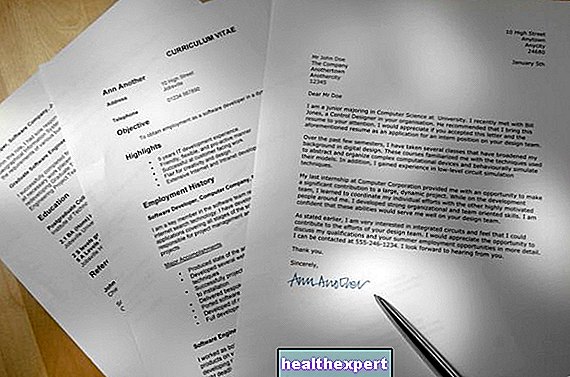How to make a professional resume: what to know from A to Z
The resume is your calling card when it comes to the world of work. You rightly want it to look perfect in the eyes of a recruiter and possibly secure an interview. How can you write a good CV? And once the interview has been won, how to hit those in front of us? Here are some tricks to make your profile as interesting as possible; in the meantime, watch the video for some tips on the interviews.
Why you need to have a curriculum vitae
You may be wondering, but in 2021 does it still matter to have a good CV to find a job? Of course yes! The curriculum vitae is one of those essential documents that a professional must have, saved on the home PC or better still directly on the smartphone: you never know when the right job opportunity presents itself! Possibly in duplicate, in the Italian and in English, so as not to be unprepared if the announcement specifies the application in a foreign language.
The job market evolves, but one of the few things that doesn't change when it comes to hiring is the importance of making a good first impression. In the digital world this means having a solid online reputation (see social media profiles on Facebook, Linkedin, Instagram ...) and a digital document that you present to the possible employer. If you work in the creative sectors you will be asked to have a portfolio of your works within reach and you can indulge yourself a little more in drafting your CV.
Do you need to review your resume (another way of calling the resume)? Are you a recent graduate / recent graduate and are you preparing your first version? When it comes to CVs, here's what matters when writing:
- Order, to help recruiters read it smoothly;
- Clarity, so that from the "hr" they immediately have an idea of who they have in front of them;
- Update, because having a curated CV means getting more chances to attract attention;
- Completeness, to help understand your path and the qualities that can be an added value for the company.

How to make a resume: the elements that work
Surely all those aspects that you think may be the most relevant from the point of view of a hiring. Therefore enter the past work experiences more in line with the application, but also the training, refresher courses, other demonstrable skills or that are considered useful in that particular context. Don't have experience yet? Focus everything on the readability and organization of the document; talk a little about yourself through your hobbies and present your studies with a motivational letter.
The content, as we told you above, must be clear and simple, without grammatical errors. Taking care of every detail is essential if you want to make an excellent curriculum vitae.
We want to make your life easier and give you some simple tips on how to write a good presentation of yourself for the job; read these 8 tips and writing a resounding CV will no longer be a problem for you:
- Find the most appropriate format (or model), because depending on the profession, different CV layouts can be used. Search online to find out which one is right for you. The important thing is that both a format that is clean, without crowding and well balanced with the spaces between the various sections; the character and the font also matter, the first must not be too small or too large, while the second must not be too particular; stay on the classics.
- Use the right tone; it goes without saying that the language must be a minimum formal since it is a professional matter.

- Sort your experiences from the most recent to the "latest. What you are aiming for is to show what you are doing now or until recently, so as to emphasize your sector of origin and your desire to be part of that" agency.
- The information must be consistent, put the correct information in the right position, so as to have a good looking resume. The recruiter will only be happy to read your CV! Watch out for the length, however, better not to exceed 3 pages.
- Enter your results, it would be a shame not to since you have worked so hard to achieve those goals. Who knows, it might be that extra thing that sets you apart from other candidates.
- Double-check the text before sending it. Having it serviced by a trusted person can be a good idea.
- Customize the CV based on the offer you are applying for. A trick to write an appropriate resume is to start from the job advertisement and insert some terms that the company has wanted to highlight in the ad text. Adapt as much as possible your training and career path so that they are on the same wavelength as the job offer.
- Align your CV with your cover letter. For completeness it is always better to have one, even if it is short and concise; run to the end of the article to find out more about this small document.

Writing a CV: the sections that must not be missing
As you will have understood by now, writing a CV is not difficult, but it is another thing to write a good curriculum vitae that optimizes the chances to ensure that your profile is selected.
Just like for any formal document, even in the case of your professional business card there are formal fields that you always tend to enter, beyond the CV model you are going to choose. The main ones are:
- Personal data. A must that absolutely must not be overlooked; after all it is like introducing yourself to a person, and the first information we have to give is personal information. Then enter the name, surname, date of birth, residence and main contacts (email and telephone). If the position for which you are applying is related to digital, it is advisable to also add the link to the LinkedIn profile and possibly to other social accounts / personal sites.
- Professional experiences. Start from the current occupation and then go on with the previous ones, always specifying the position covered and the related responsibilities. In this section it is usually recommended to leave out those positions that are not relevant for the purpose of the application (unless your experiences are very few or null).
- Formation. Which includes all the studies completed in descending chronological order, starting from the most recent experience (master or degree), up to high school. Are the grades to be entered? It depends. If they are very good you can indicate them, otherwise it is better to omit the information .
- Professional and personal skills. In other words, your strengths and weaknesses, but also your expectations about a job. Sincerity always wins!
- Foreign languages and computer skills. You can put them in the form of a table or as a bulleted list, but the important thing is that they appear.

The extras to make your profile jump to the top of the list
Put yourself in the shoes of a recruiter whose job is to skim resumes several times a week. The result? That at the end of the day the received files all look the same ... that's why you have to try to stand out from the crowd! How to do? The answers vary greatly depending on the type of job you are looking for and the CV templates you have downloaded and filled out. Basically, if you are not applying for graphic or creative positions, your resumes should not be too eccentric; this does not mean that we cannot try to capture attention with small tricks.
To create a truly perfect curriculum vitae you could think of attaching a short video presentation to your paper CV in which you talk about yourself and your professional experiences: a video resume! It may seem strange to you, but in the United States it is already depopulating. Here's how to do it: prepare a small presentation that traces what is said in the digital CV, and expose it by having an acquaintance film you with a mobile phone. It will take several tests before you like what you have produced; being a sort of second resume it is important to be confident, bright and casual.
Doesn't the idea of getting involved in video make you crazy? You can simply insert a photograph of yourself in your CV.The photo in the resume is not compulsory, but if you have a professional enough one where you have come out particularly well why not? Miraccomando, no photos in a bikini or while you are at the restaurant.
Let's open a little parenthesis for those interested in applying in the UK: the photo is not recommended because the standards of a British CV are much more aseptic than the Italian ones.
However, it remains mandatory to write your CV at least in English.

The most common mistakes not to make when writing a resume
What absolutely not to do while filling out a resume? There are some missteps to avoid, but the most important things that recruiters don't like are having unclear information and disorganized resumes in their hands, or worse still containing grammatical errors. Always remember to dedicate all the time necessary to compile your CV, your future is at stake!
Check out this list and run straight away to edit your professional presentation:
- Avoid spelling or typing errors; double check and double check because such oversights immediately jump to the eye and the message that is passed to the recruiter is that the CV was not "tailored" for the position.
- Do not choose an excessive layout, you risk to eclipse your skills and also to use graphics to hide that you are not able to tell yourself. Likewise, do not use a too standardized model, such as the European one (Europass), unless specifically requested.
- Omit experiences that are not relevant to the position you are applying for. Your goal must be to present yourself in the best possible way for a given job.
- It weighs the words well, and the tones. It is not a good strategy to pose with the risk of appearing superior. The register will always be conversational and professional.
- Do not lie! It is useless to write about knowing how to do something when it is not true, they could make you test the skills praised on the resume during the interview ...

How to bypass ATS bots to look for work
So far everything clear about the steps to follow to make an effective CV? Great! We've told you pretty much everything there was to know, but we want to give you a few last tips to get a great resume in hand.
We mentioned recruiters and their CV skimming job, but when aren't they doing this? In fact, nowadays there are tools to support the HR department, which allow to streamline the workload of a recruiter. We are talking about the ATS (Applicant Tracking System), basically the bots that systematically analyze an exorbitant number of applications and are also able to make an almost instant analysis of them.
It is possible to make a resume that does not fear ATS, but you have to be smart and insert some keywords that were used in the drafting of the ad itself. In this way your CV will still be relevant and will not be discarded a priori by the system. Obviously you must not exaggerate in the use of keywords; look for the right balance. In the end, the curriculum will still go into the hands of a natural person, if it is considered valid. Therefore, it is better to set up the resume so that it can be read by both a bot and a person.
ATSs don't like fancy fonts and extravagant templates. Avoid elements that are too complex as they may not be detected correctly. Optimize the keywords in the professional skills section: this is the part the bot focuses on, because it is the most objective part of your CV.
When you have to insert a qualification or a certificate highlight it both with the abbreviation and in full, by doing so you make sure that the ATS correctly analyze the contents of the CV.
Finally, even if a machine sees your text first, don't leave anything to chance and read it several times before sending the file, so as to avoid possible grammatical errors. A simple typo may be enough to compromise your appearance in the shortlist of final candidates.

The cover letter: what to write
In English-speaking countries it is mandatory, it is almost more important than the resume: the cover letter is the opportunity you have to show your discursive skills and to entice the recruiter to analyze your profile thoroughly.
Not everyone finds it easy to write, but that doesn't mean it's impossible to write a letter that will impress the recruiter! Just keep a few small tips in mind.
What is it about? The motivational letter is a small excursus about you, which can be useful in different moments of your career; you can use it to apply for a competition, to apply for admission to the university, or it can be used to apply to an internship or Erasmus.
This letter accompanies the curriculum vitae in introducing ourselves to a "company or a" university, and is read before the CV. This is why it must be drawn up carefully, listing well our reasons that lead us to apply for a final position. If you manage to capture the attention of a recruiter with the cover letter, you are already halfway there! In our opinion, here's what an effective cover letter shouldn't be missing:
- A specific recipient. Do some research on the company and try to find out which department deals with the applications; for more structured companies it is possible that there is a Linkedin profile of an employee to sponsor the offer. If you do not find anything, opt for a generic term such as Dear Human Resources Manager or Dear company name.

- The reference to the company for which you are proposing as an employee. Find out online and find out about their activities, the sectors in which they operate and perhaps grasp some useful links about the values or mission that you can include in your story.
- Your skills, focusing on the added value that you could be for a particular department. Don't repeat word for word what you've already said on the resume, but take a more conversational approach.
- A link with your resume with, for example, the inclusion of similar phrases: "as you can read in my attached CV" or "in the job performed at company X ..".
- A "letter" structure, with an introduction, a body and final greetings.
Basically, with the cover letter you have to create a discursive and comprehensive document about yourself, but short. Our advice is not to go over a page. It is perfectly fine to talk about your soft skills and passions in this excursus, especially if you are very young.
Offer your skills to the recruiter, and if you're lucky he'll want to learn more! Ready to face the interview?
- Cvapp
- CvWizard